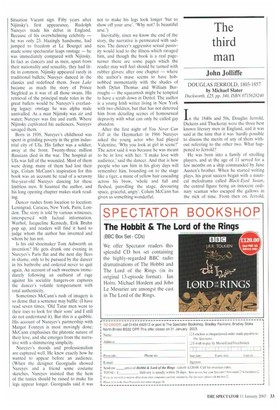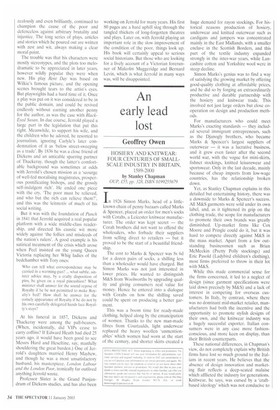The third man
John Jolliffe
DOUGLAS JERROLD, 1803-1857 by Michael Slater
Duckworth, £25, pp. 340, ISBN 0715628240 In the 1840s and 50s, Douglas Jerrold, Dickens and Thackeray were the three best known literary men in England, and it was said at the time that it was 'hardly possible to discuss the merits of any of them without referring to the other two. What happened to Jerrold?
He was born into a family of strolling players, and at the age of 11 served for a few months on a ship commanded by Jane Austen's brother. When he started writing plays, his great success began with a nautical melodrama called Black-Eyed Susan, the central figure being an innocent ordinary seaman who escaped the gallows in the nick of time. From then on, Jerrold,
zealously and even brilliantly, continued to champion the cause of the poor and defenceless against arbitrary brutality and injustice. The long series of plays, articles and stories which he poured out are written with zest and wit, always making a clear moral point.
The trouble was that his characters were mostly stereotypes, and the plots too melodramatic to be appreciated in later years, however wildly popular they were when new. His play Rent Day was based on Wilkie's famous picture, and the opening scenes brought tears to the artist's eyes. But playwrights had a hard time of it. Once a play was put on it was considered to be in the public domain, and could be revived endlessly without earning another penny for the author, as was the case with BlackEyed Susan. In due course, Jerrold played a large part in the legislation that put this right. Meanwhile, to support his wife, and the children who he adored, he resorted to journalism. ignoring Carlyle's later condemnation of it as 'below street-sweeping as a trade'. By 1836 he was a close friend of Dickens and an amicable sparring partner of Thackeray, though the latter's comfortable background was sometimes at odds with Jerrold's chosen mission as a 'scourge of well-fed moralising magistrates, prosperous pontificating bishops, and the grossly self-indulgent rich'. He ended one piece with the cry, 'The poor must be relieved. and who but the rich can relieve them?'. and this was the leitmotiv of much of his social writing.
But it was with the foundation of Punch in 1841 that Jerrold acquired a real popular platform with a wide middle-class readership, and directed his caustic wit more widely against 'the follies and misdeeds of the nation's rulers'. A good example is his satirical treatment of the crisis which arose when Peel insisted on the young Queen Victoria replacing her Whig ladies of the bedchamber with Tory ones:
Who can tell what correspondence may be carried in a warming-pan? ... what subtle, sinister advice may, by a crafty disposition of pins, be given on a royal pincushion? What minister shall answer for the sound repose of Royalty if he be not permitted to make Royalty's bed? How shall he answer for the comely appearance of Royalty if he do not by his own carefully delegated hands lace Royalty's stays?
At his funeral in 1857, Dickens and Thackeray were among the pall-bearers. (When, incidentally, did VIPs cease to carry coffins? If Edward Heath had died 25 years ago, it would have been good to see Messrs Hurd and Heseltine, say, manfully shouldering the great burden.) One of Jerrold's daughters married Henry Mayhew, and though he was a most unsatisfactory husband, his masterpiece, London Labour and the London Poor, ironically far outlived anything Jerrold wrote.
Professor Slater is the Grand Panjandrum of Dickens studies, and has also been working on Jerrold for many years. His first 80 pages are a hard uphill slog through the tangled thickets of long-forgotten theatres and plays. Later on. with Jerrold playing an important role in the slow improvement of the condition of the poor, things look up. His book will certainly appeal to serious social historians. But those who are looking for a lively account of a Victorian forerunner of Malcolm Muggeridge and Bernard Levin, which is what Jerrold in many ways was, will be disappointed.



























































 Previous page
Previous page